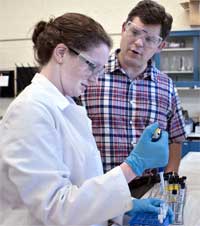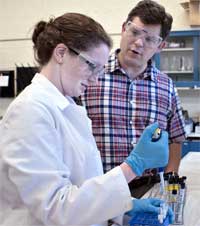 KINGSTON, R.I. – July 8, 2011 – An increasing number of consumer products are being made with engineered nanoparticles – from electronics and cosmetics to auto parts and sporting goods – and yet little is known about how those particles affect biological systems when released from the products into the environment.
KINGSTON, R.I. – July 8, 2011 – An increasing number of consumer products are being made with engineered nanoparticles – from electronics and cosmetics to auto parts and sporting goods – and yet little is known about how those particles affect biological systems when released from the products into the environment.
With the help of a $400,000 grant from the National Science Foundation, a University of Rhode Island engineering professor intends to find some answers to this potentially worrisome problem. The grant was awarded through the NSF Faculty Early Career Development Program, the most prestigious NSF grant program supporting junior faculty members.
Geoff Bothun, URI associate professor of chemical engineering, is examining how nanoparticles interact with bacterial membranes. He said that bacteria play a critical role in the environment, and there is evidence that nanoparticles can attach to biological membranes and alter membrane structure and function.
Nanoparticles are sub-microscopic particles that bridge molecules and bulk materials. “Clearly not all nanoparticles are dangerous, but some are toxic, depending on their size and surface properties,” Bothun said, “Determining what makes nanoparticles toxic is not trivial, because the mechanisms involved are complex and involve both chemical and physical interactions.”
Bothun will begin his research by creating simple models of bacterial membranes, to which he will introduce various nanoparticles with different size, shape, and surface coatings. He will then work with more complex membrane models before extending the work to reconstituted bacterial membranes. Because nanoparticles are so small and difficult to study, the URI researcher also hopes to develop new tools that can be used to evaluate the interaction between nanoparticles and cell membranes.
“Ultimately we intend to develop a comprehensive understanding of how nanoparticle size and surface chemistry influences the disruption of bacterial membranes,” said Bothun, a resident of West Kingston. “We want to create a framework that will enable us to determine whether nanoparticles, from a given source or product, could lead to the destabilization of cell membranes and eventual cell death. This information is needed to help design safe products containing nanotechnology.”
An important element of the National Science Foundation’s early career grants is to link research with teaching and outreach. So Bothun will work with teachers and students at Times Squared Academy in Providence and other urban high schools to create teaching modules that will convey what nanotechnology is, how it may influence students’ lives in the future, and what related career opportunities are available to pursue.
As part of this outreach effort, Bothun will set up a program that will enable high school students to collaborate with URI students and visualize different nanoparticles by accessing URI’s transmission electron microscope remotely from their school classroom.
The grant will also enable Bothun to develop new course material for URI students interested in nanotechnology.
Pictured above
Chemical Engineering Prof. Geoff Bothun and student Eily Cournoyer
URI Department of Communications & Marketing photo by Michael Salerno Photography.

